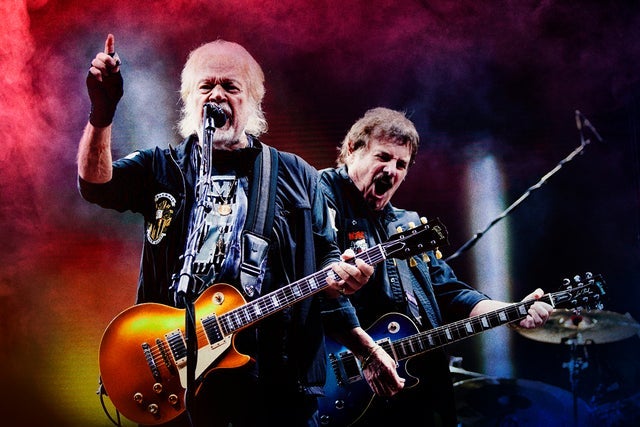Prairie pop to arena grit
The Guess Who came up from Winnipeg, mixing garage rock bite with soulful pop writing. This run centers on the modern lineup led by singer
Derek Sharp, with classic-era voices like
Burton Cummings and
Randy Bachman not in the fold. The identity now leans on tight harmonies, bright keys, and riffs that punch, plus newer cuts from
Plein D'Amour.
What they will likely roll out
Expect a set built around
American Woman,
No Time, and
These Eyes, with a mid-show nod to
Undun. You see couples who grew up with AM radio, twenty-somethings who learned the riffs in lessons, and parents trading song facts with grown kids. The famous
American Woman riff began as an onstage jam after a broken string at a 1969 show in Ontario.
No Time was re-cut slower for the
American Woman album, which is the version most bands play now. Please treat the song picks and any production notes here as informed speculation rather than a fixed plan.
Denim, Patches, and Polite Shouts: The Guess Who Crowd
Vintage tees, modern chorus
Expect a mix of weathered tour shirts and new reprints, plus denim and boots that look broken-in, not costume-like. People tend to stand for the first riff of
American Woman and sway through
These Eyes, with quick, friendly cheers between songs. You hear quiet gear talk at the bar, like someone pointing out a rotary speaker patch or a new finish on the guitar.
Rituals without fuss
Merch lines skew toward classic logo designs and city-specific posters, and a few folks collect the setlist after the encore when offered. Chant moments pop up on the long oohs in
No Time, while the outro of
Share the Land brings a warm, many-voice blend. Pre-show playlists often pull from late 60s and early 70s Canadian rock, which sets the tone without feeling like a museum. The mood is respectful but lively, with room for families and die-hards to trade memories without crowding each other.
Guitars First, Voices Center: The Guess Who On Stage
Riffs with air around them
Live, the guitars stay crunchy but leave space for keys and voice, which keeps the hooks clean. The band often drops keys down a half step on a couple of tunes so the melodies sit where the lead can carry tone, not strain. Drums favor a straight, heel-down pocket, letting bass outline simple, sticky shapes that push the choruses.
Small changes that land big
Keys cover organ swells and the flute line from
Undun, and they double vocal lines for extra sparkle without clutter. Arrangements stretch the intros of
American Woman and
No Time just enough for crowd energy to rise, then snap back into the verse. They like to tag a short blues turnaround at the end of the heavier numbers, which gives the band a quick chance to trade licks. Lighting washes track the song mood rather than chase every hit, so the focus stays on time feel and blend. A small but cool quirk is how the guitar player switches to a semi-hollow for
Undun, which softens the attack and brings out the jazz shade.
Kindred Sounds That Point To The Guess Who
Kindred road warriors
Fans of
Three Dog Night will recognize the polished vocals and radio-era hooks that still hit live. If you enjoy the groove-forward guitar and warm keys of
The Doobie Brothers, this show sits in that same comfortable pocket. The blue-collar rock stomp and crowd call-backs share DNA with
Grand Funk Railroad, especially when the band leans into longer riffs. For acoustic-leaning singalongs and open-road nostalgia,
America is a natural neighbor.
Why these fits make sense
All of these acts balance sturdy choruses with players who can stretch a middle section without losing the song.



